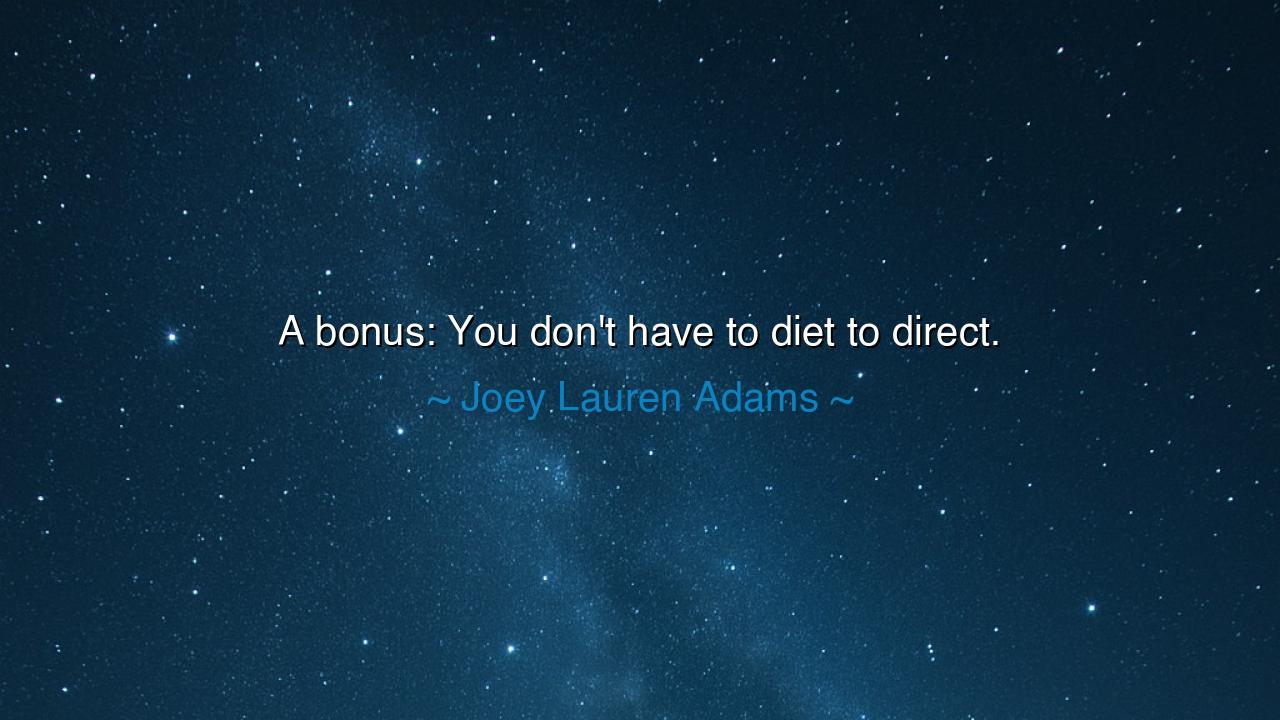
A bonus: You don't have to diet to direct.






When Joey Lauren Adams remarked, “A bonus: You don’t have to diet to direct,” she spoke with a wit that conceals deep wisdom—a reflection not merely on filmmaking, but on the human hunger for freedom from illusion. Her words may sound light, almost playful, yet they carry the power of a quiet rebellion. In them, we hear a woman’s sigh of relief, an artist’s laughter at the vanity of appearances, and a timeless truth that the worth of creation lies not in the body’s perfection, but in the mind’s mastery.
In the ancient world, to direct was to lead—to command not armies, but visions, passions, and human stories. The Greek dramatists—Sophocles, Euripides, Aeschylus—stood as both writer and director, guiding actors to embody the souls of gods and mortals alike. They did not starve themselves for approval, nor did they shape their bodies for beauty’s gaze. Their task was the pursuit of truth through art. Adams’s statement, in this sense, revives that ancient spirit. She celebrates the liberation that comes when a creator ceases to serve the mirror and turns instead to serve the muse.
Her use of the word “diet” becomes a metaphor for conformity—the quiet, constant demand that one must shrink oneself to fit within society’s expectations. In the world of acting, as in life, appearance often overshadows essence. To “diet” in this symbolic sense is to sacrifice authenticity for approval, to become smaller so that others might feel comfortable. But the act of directing, as Adams notes, releases the artist from this prison. The director commands from behind the lens, not by how she looks, but by what she sees. Her power is no longer tied to the surface, but to vision—the power that shapes story, guides emotion, and orchestrates meaning.
This wisdom echoes through the ages. Consider Hypatia of Alexandria, the philosopher and teacher who defied the confines of her time. In an era that sought to silence women’s voices, she stood in public halls, teaching men the movements of the stars. She wore no adornment, sought no approval; her beauty was that of the mind illuminated. Like Adams, Hypatia did not “diet to direct.” She did not diminish herself to fit a role but expanded beyond the boundaries imposed upon her. The essence of leadership—be it in philosophy or film—is not to conform, but to create.
Yet Adams’s remark also carries a note of tenderness, even humor, toward the absurdity of modern culture. The ancients, too, laughed at such vanity. The Roman satirist Juvenal mocked those who starved themselves for beauty, reminding them that the gods cared little for their flesh, but much for their spirit. In saying, “you don’t have to diet to direct,” Adams becomes a modern Juvenal—reminding us that the worship of form over substance is the mark not of wisdom, but of folly. Art, like virtue, cannot be measured in inches or calories; it is measured in depth, daring, and devotion.
There is, however, a deeper lesson beneath the humor—a lesson about freedom and self-worth. Adams speaks as one who has lived within a world of scrutiny, where women are often valued for their reflection rather than their reality. Her laughter, therefore, is not naïve—it is victorious. It is the laughter of one who has escaped the tyranny of the gaze. In declaring her independence from “diet,” she declares allegiance to authenticity, to the life of the mind and spirit. It is a reclaiming of purpose from performance.
Thus, her words become a call to all creators—and to all souls: nourish the mind more than the mirror. Feed the fire of imagination, not the hunger for perfection. For in the realm of true creation, it is not the body that leads, but the vision; not the figure that inspires, but the voice that dares to speak. The ancients taught that one must first master the self before mastering the world. Adams reminds us that such mastery does not come through denial, but through self-acceptance.
Let this be the lesson, then: that greatness requires not starvation, but fullness—of thought, of passion, of courage. To “not diet to direct” is to live beyond appearances, to create from abundance rather than lack. It is to remember, as the old philosophers did, that art is not born from the body’s conformity, but from the soul’s rebellion. For those who lead with vision, freedom is the only nourishment needed, and creation itself is the truest feast.






AAdministratorAdministrator
Welcome, honored guests. Please leave a comment, we will respond soon